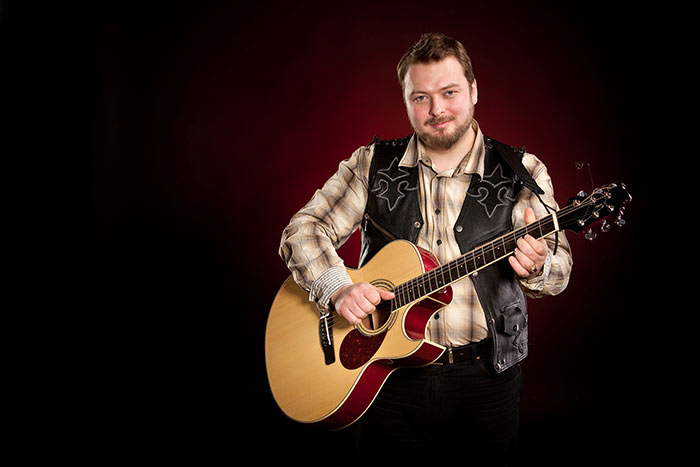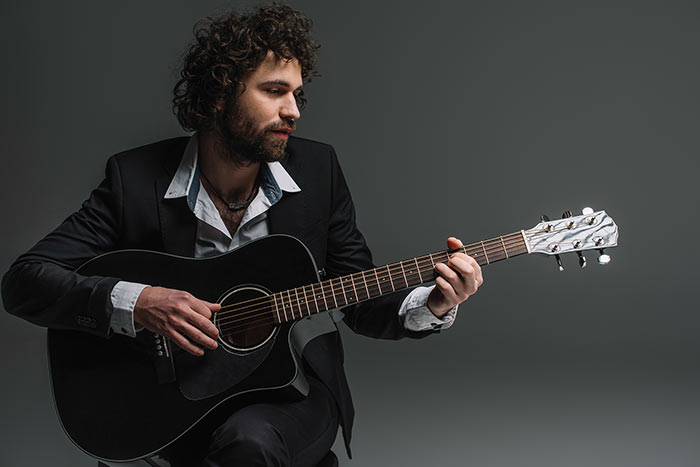Maybe you’ve had it sitting there in the corner for ten years, or you dabbled when you were a teenager. Perhaps it was a gift for Christmas one year but you weren’t sure where to start.
You’ve looked online but there’s such an overwhelming amount of information you don’t know what to believe!
So how long does it take to learn the guitar anyway?
Let’s make it clear from the get-go that there’s no one-size-fits-all approach to how long this takes.
Sure some sources will tell you that you need however many hours experience before you can say you can play the guitar, but every student is different which is why it is important to not countdown these hours to be able to tell all of your friends that you now play the guitar.
Everyone learns the guitar for a different reason, which is why everyone’s musical journey is unique.

Define Your Goals
The two questions that I ask all of my students when I meet them for the first time is “what kind of music do you like?” and “what made you want to start learning the guitar?”.
From these two questions, I can start to get to know a lot more about the person and what made them embark on their musical journey.
Some people I know had played the guitar many years ago in their younger years but had to put it down when life got in the way and never had a chance to pick it up again.
Some people just saw a video on youtube and thought that it looked cool.
Others were maybe forced into it by their parents or partner without much say in the matter!
Everyone’s story is different, which is why it is important to understand what you want to get out of learning the instrument.
Do you want to be able to play along to your favourite songs, or have a hobby to keep you occupied in your spare time?
Maybe you have peers that play in a band and you’d like to get there in a few years?
Or maybe you want to be the next Jimi Hendrix!
All are valid reasons for wanting to learn.
I am a big believer in teaching to the student’s goals, and not showing them unnecessary information that isn’t going to benefit their journey of learning the guitar.
For example, if they want to jam out to their favourite classic rock tracks, I’m not going to sit them through months of tedious lessons to teach them how to read music notation.
Or if they want to be able to play the guitar and sing some covers at a jam night I’m not going to show them every scale know to mankind if this isn’t going to benefit them at the time.
Of course, goals can change over time, and even though you may not want to learn how to improvise at the present, this could become a goal of yours in 12 months.
Learning the guitar can happen in many different ways and styles, so have a think about what you want to achieve before you dive in.

How do you plan on learning?
The second thing to think about and perhaps the most important is how do you plan on learning the guitar?
Are you going to find yourself a personal tutor, or learn from YouTube videos online?
There is an absolutely overwhelming amount of resources on the internet on how to learn the guitar, which although is great at sparking peoples interest, can sometimes be misleading and can cause people to lose their motivation.
If you are planning on learning exclusively from YouTube videos and online sources such as Ultimate Guitar TABs, there are a few things to be aware of.
First of all, anyone can upload a guitar lesson or resource to the internet, meaning there will be varying degrees of quality of resources out there.
I would start with the bigger YouTube guitar channels which have a lot of subscribers and a good ratio of positive ‘likes’ on their videos.
If you see a lot of positivity in the ratings and comment section, you’re probably safe.
Just think, if you’re looking for a restaurant to go to for dinner and you see online that it has poor reviews, are you going to eat there?
I think having a look online at trusted resources is a great way to get started, but I think at every point a beginner guitarist should seek some 1:1 lessons with a credible tutor to steer them in the right direction.
There are many people out there offering guitar tuition services, so it’s important to remember that price will reflect quality.
Have a look online to see what local tutors or music schools are in your area, and feel free to contact them to have a quick chat about the possibility of commencing lessons.
Even though it is normal to feel a little anxious about your first lesson with a professional tutor, a good teacher will always make the learning process pleasant in a relaxed environment. I always like to approach it like two people just hanging out talking about the guitar, while I guide them through the material that they have been working on. At no point should it feel intense or something to dread!
A good tutor will also pay attention to the students needs to identify possible holes in their knowledge, whether that be in a theory, technique, or ear-training sense.
I always start by making sure a student has the techniques needed for a particular song that they may want to learn, before diving into a tune.
For example, if they wanted to learn a song like ‘Sitting, Waiting, Wishing” by Jack Johnson which uses a lot of bar chords, I would first make sure they were comfortable with bar chords.
If not I may spend a lesson talking through the different shapes and how to make each chord on the neck depending on where the root note lies, and also making sure their technique will allow them to apply enough pressure to make a clear sound.
It is not only the tutor’s job to identify what material and techniques would be beneficial to the students learning, but also to suggest pieces and techniques that may challenge a student, to further their ability on the guitar.
I like to keep my lessons quite open in terms of the material the student wants to cover.
I’ll often ask them to list a bunch of songs/artists that they like, for me to listen to in order to decide on what will be most appropriate to learn at the time.
Often students will ask me to learn a song that is far too difficult for them at present, but six months down the track may be perfect for them once their playing has developed.
As a newer student, they most likely aren’t going to know what a good level of difficulty is, which is another great reason to find yourself a tutor.

How much time can you dedicate to practice?
So although everything mentioned above is important in getting yourself set up for a successful journey to learning the guitar, the real secret is practice.
The funny thing is I see student after student comes to me asking what the secret to getting good at guitar is, and why they can’t seem to learn after owning one for several years but hardly ever picking it up.
The irony is that there is no secret, it simply is just spending time on the instrument.
Someone who is serious about learning the guitar should aim to practice every day.
I am a big believer in short but frequent bursts of practice.
I think 15 minutes of practice seven days a week will give you better results than 2 hours of practice on one day of the week.
I have found through experience that the more time we let our brain absorb the material that we are practising, through constant little reminders, the more thoroughly we will remember them.
Of course, if you can dedicate a little more time to practice each day, say 30 minutes, then even better!
Everyone’s schedule is different, so it’s important to remember that one size does not fit all.
One piece of advice that I often give to students is to have their guitar easily accessible at home so that it’s easier for them to pick it up and start practising right away.
Having it on a guitar stand in your bedroom or living room will constantly remind you that it is there to be played at any spare minute, half-hour or several hours that you may have free.
Try to avoid keeping the guitar in its case at home (unless you are planning on going away or planning on not playing for several months), as the psychological battle of thinking about taking it out of the case, getting your books/worksheets ready etc. will be enough to deter any seasoned musician away from the practice.
By having it all ready to go, and any worksheet on a music stand ready to be played, this allows you to make use of any spare moment that you may have. Don’t feel as though a spare 5 minutes isn’t worth it either!
I’ll often pick up my guitar for 5 minutes if I’m waiting to go out or just have a moment that can be used for practice!
For adults, I often recommend finding a regular time for them to practice, and to treat this as though it were a scheduled meeting. Many adults will practice after work, so perhaps finding the most suitable time in the evening would work best.
Many of my students find that practicing just before or just after eating dinner works best for them.
I find morning practice to be the most effective, as this is when my brain is more active before it’s had the rest of the day to become drained. This may not be possible for everyone around their work schedule but could be worth trying over the weekend.
I think organising your practice is important also. I will often practice my material in this order:
- Warm up: trying a few simple exercises such as a chromatic scale up the neck, a few scales/ arpeggios to get the fingers moving, or some timing exercises with a metronome. Also very important early in the day when the fingers may still be half asleep.
- A simple tune to play along to: either a tune you have been playing for a while that you can jam out to along with the track, or something that isn’t going to be too technically demanding. I believe this to be quite important since this will get your mojo going and get you into the groove of things.
- Work on your most challenging material: It’s important to not do this straight away, as you won’t be warmed up enough yet and probably won’t be able to execute it as well as you were last practice session or if you had already warmed up. It’s also important to not leave this until last, as you may be more drained if you have been playing for a while or it is later in the evening.
- Warm down: to finish off my practice session I like to play along to some simpler songs or do some general scales etc…, much like we did at the beginning of the practice session. It is important to finish your practice session on a positive note even if your challenging material was difficult on that day, to keep you motivated for your next practice session. Also on a physical level, if your challenging piece was very technically demanding and involved a lot of speed which would really work your hands, it’s important to warm your hands down after this. Think of it like warming down after exercise.

How much can you dedicate to your instrument?
The amount of money that you’re willing to invest in purchasing a quality instrument and the accessories that come with it is something worth discussing also.
Nowadays asking how much a guitar is worth is the equivalent of asking the length of a piece of string.
You can get guitars for next to nothing, while others are worth as much as a very nice house!
I wouldn’t recommend buying the cheapest guitar that you can find, as a poorly made instrument will not feel nice to play, won’t stay in tune and won’t sound very good if you can even manage to get it in tune.
This would be a one-way ticket to making you hate the guitar, so it’s important to invest a little more to get you something comfortable and reliable to play.
You don’t have to break the bank either since many of the well-known manufacturers are making quality instruments for just a few hundred pounds.
Many beginner to intermediate level instruments will often come in a pack with the accessories that you will most likely need, such as a case, guitar plectrums, guitar tuner, a capo, and much more!
If you’re looking to get into the electric guitar, you can often buy your first electric in a bundle with a small practice amplifier, an option that many people take advantage of.
It can be incredibly hard to know what you’re looking for also, so perhaps wander into your local music store to ask the friendly staff their recommendation, or perhaps you could borrow a friends guitar to have a few lessons on with a tutor before asking them what they recommend.
Many students of mine have either hired instruments or started out with a cheaper instrument with the intent on upgrading soon after commencing lessons.
Second hand is a great option also!
If you’re looking to get a bit more bang for your buck, have a look online for people selling their used instruments.
Often you will find something that is in almost new condition for a fraction of the price.
Again perhaps discuss this with your tutor to see if they would recommend the particular instrument that you are hoping to purchase, as they can advise on whether they think it would be a safe buy.
By no means should you fork out thousands of pounds into buying a top of the range model (unless you really love a particular brand and want to treat yourself), but spend a few hundred pounds if you can to make sure your instrument won’t hinder your progress and more importantly your love for the guitar!

So how much time are we talking then?
You could apply all the practice tips and tricks, but you’d probably still like to know roughly how long it’s going to take before you start to hear yourself playing your favourite tune, or before you rip your first guitar solo I’m guessing?
I have seen students go from complete beginner who doesn’t even know how to hold the guitar in their first lesson, to strumming along to their favourite song in a matter of weeks!
This would be a student who is able to sit down with their guitar most days to put in a reasonable amount of practice.
On the flip side of the coin, I’ve seen students who only play the guitar in their lessons with me make very slow process over the course of six or twelve months, so it’s important to realise that you very much get out what you are able to put in.
If your goals are a little more complex, such as beginning to improvise, this may take a little longer, say 6 months to a year of tuition, since it would be important to go over the basics to develop a solid core knowledge.
Again, these are just rough numbers. I’ve also seen students learn all the basic chord shapes and strumming along to songs very confidently in just over a month!
This would be the sort of student who simply can’t put the guitar down and clocks a lot of hours in their first few months of learning.
Make sure your practice doesn’t become a chore as well.
If you enter your practice session in the same frame of mind as doing the dishes or housework, you won’t be able to retain what you’re learning as thoroughly as if you’re loving every minute of it!
Learning an instrument is definitely something that requires a lot of dedication, so make sure you enjoy the process.
The beauty of learning the guitar is that we never stop learning, so we may as well enjoy the ride!







